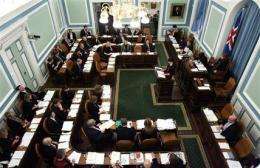Tech-savvy Iceland online for new constitution

(AP) -- How do you write a new constitution in the 21st century? You go where the people are - online.
That was the decision of tiny but tech-savvy Iceland, which is overhauling its constitution in the wake of an economic catastrophe, and has turned to the Internet to get input from citizens.
The 25-member council drafting the new constitution is reaching out to Icelanders online, especially through social media sites Facebook and Twitter, video-sharing site YouTube and photo site Flickr.
Iceland's population of 320,000 is among the world's most computer-literate. Two-thirds of Icelanders are on Facebook, so the constitutional council's weekly meetings are broadcast live on the social networking site as well as on the council's website.
"It is possible to register through other means, but most of the discussion takes place via Facebook," said Berghildur Bernhardsdottir, spokeswoman for the constitutional review project.
When the North Atlantic island nation gained independence from Denmark in 1944, it simply took the Danish constitution and made a few minor adjustments, such as substituting the word "president" for "king."
A thorough review of the constitution has been on the agenda ever since, but action came only after the crisis in 2008, when Iceland's main commercial banks collapsed within a week, the krona currency plummeted and protests toppled the government.
"To me, it has long been clear that a comprehensive review of the constitution would only be carried out with the direct participation of the Icelandic people," said Iceland's Prime Minister Johanna Sigurdardottir, one of the champions of the constitutional review since taking office in 2009.
She says it is a "distinct possibility" that the draft constitution will be put to the people in a referendum before Iceland's parliament debates final approval.
The 25 members of the constitutional council were elected by popular vote from a field of 522 candidates aged 18 and over. The council is basing its work on a 700-page report prepared by a committee that took into account the findings of 950 randomly selected Icelanders - the National Forum - who met for a day to discuss the division of powers, conservation and protection, foreign relations and more.
But, the Internet component is still the most direct route for most Icelanders to weigh in. Members of the public must provide their names and addresses, and can then submit online recommendations, which are approved by local staff to avoid Internet heckling. The ideas are then passed on to the council, and are open for discussion online.
"The sort of argumentative and negative discussion that has been common on Icelandic blogs and news sites, especially since the economic collapse, has been almost entirely absent," Bernhardsdottir said.
Recommendations have spanned a wide range of topics, from improving the treatment of livestock to making it easier for authorities to seize stolen property, said Thorvaldur Gylfason, a professor of economics at the University of Iceland and a member of the council.
Suggestions approved by the council - including livestock protection - are added to the draft constitution, which is accessible online and open for comment.
It remains to be seen whether Icelanders can unite behind the most emotionally charged sections of the proposed constitution, such as nature conservation and ownership of Iceland's natural resources. Major power projects, the threat of a global water shortage and fierce controversy over the rights to natural resources such as fishing grounds and geothermal energy have made Icelanders keenly aware of the value of their environment.
"The proposed constitution defines access to clean and unspoiled nature as a human rights issue," Gylfason said. "This strengthens the position of those who wish to seek justice as a result of environmental damage."
Another new clause tackles the contentious issue of who owns natural resources. When Iceland's fisheries management system was introduced in the 1980s, certain companies were awarded fishing quotas for a nominal fee, giving them exclusive and lucrative rights to fishing grounds.
"This clause has been eagerly awaited by the nation and stipulates that Iceland's resources, including its fishing grounds, are the property of the nation," which therefore has the right to the resources, Gylfason said.
The draft constitution is due to be completed by the end of June, though the council may ask for an extension of one month. After that, it will be sent to Iceland's parliament for debate and approval.
More information: The process, http://stjornlagarad.is/english/
©2011 The Associated Press. All rights reserved. This material may not be published, broadcast, rewritten or redistributed.


















